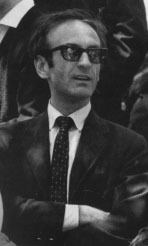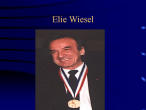|

|

|
| On September 30th,1928 Elizer Wiesel was born in Sighet
Transylvania. Today Transyalvania is called Romania. Elie
led a presentative life in the small town of Sighet. Most of his
life revolved around his family, his religious study, God and his
community. Elie lived through Aschwitz, Buchenwald and Gleiwitz.
Wiesel spent a few years in an orphanage until 1945. in 1948 Elie
went to study at the Sorbonne in Paris. Some of his subjests were
literature, philosophy, and psychology. Elie got involved in
writing for the French newspaper L'Arche. |
| Francois Mauriac inspired Wiesel to write about the
concentration camps and the Holocaust. Elie ended up writing over
30 books. The first book Elie wrote was in 1954. It was
called And the World Remained Silent. Elie was awarded the
Congressional Gold Medal of Achievement. Unfortunaltly he was hit
by a taxicab in New York City. Wiesel was in a wheel chair for
almost a year. During the time he was in the wheelchair he decided to
become a U.S. citizen. Elie was appointed president's Commission
to the Holocaust. The President's Commission made an American
Memorial to the people who sied in the Holocaust. Elie was happily
awarded the Nobel Peace Prize in 1986. |
| The President's Commission made a museum honoring the
Jews who were killed by Hitler and the Nazi's. Elie says that the
reason the museum was made was denying the Nazis a pothumous victory,
honoring the victims wish to tell and protecting the humanity from the
evil Nazis. All Jews were victims of the Holocaust. The
commission is made up of 57 people who decide where to divide the
museums into which area. The groups are: memorial, museum,
education, research, comemoration and actions to make sure that the
problems don't reaccure. The commission is made up of Senators,
Rabbis, Christians, Professors, judges, Congressmen, Priests, Jews, men
and women. Wiesel was chairman of the commitee in 1986. |
| Wiesels information was
definitley noteworthy. Elie dedicated the later part of his life
to the establishment of the second-generation and that the memory and
action be carried on. Wiesel said," Let us remember, let us
remember the heroes of Warsaw, the martyrs of Treblinka, the
children of Auschwitz. They fought alone, they suffered alone,
they lived alone, but they did not die alone, for something in all of us
died with them." |
| Elie Wiesel was sent to
Auschwitz in 1944. his father died in Buchenwald in January
1945. In April 1945 Elie was liberated from Auschwitz. He
began to be a journalist in 1948. Elizer went back to his hometown
of Sighet in 1964. In that same year he went to Russia for his
first time. In 1966 Elie published his book Jews of Silence.
He also published memoirs in 1995. |
| In Elie's book, Night, he
wrote: "Never shall I forget that night, the first night in
camp, which has turned my life into one long night, seven times cursed
and seven times sealed. Never shall I forget the little faces of
the children, whose bodies I saw turned into smoke beneath a silent blue
sky. never shall I forget those flames which consumed my faith
forever. Never shall I forget those that nocturnal silence which
deprived me, for all eternity, of the desire to live. Never shall
I forget those moments which murdered my God and my dreams to
dust. Never shall I forget these things, even if I am condemned to
live as long as god himself. Never." |
| Elie Wiesel had two older
sisters and one younger sister named Tzipora. Romania was the
country that was also claimed by Hungary. When Elie was growing up
he spoke Yiddish at home and Hungarian, Romanian, and German in
public. When he was going to school he learned how to speak
Hebrew. His mother's family was part of Hasidic sect of
Judaism. Elie loved the mysticism and folk tales of the
sect. He devoted himself to religious and study of modern
Hebrew. |
| Early in WWII Sighet was
not deeply effected. Sighet was controlled by Hungary instead of
Romania. The Jews thought they were safe from persecution in
Sighet while Jews in Germany and Poland were really suffering. The
Jews were sent to camps in Poland. Elie and his father were
seperated from his mother and sisters. Elie was 15 at the time.
The next year he was sent to Buna, Gleiwitz, and Buchenwald.
Elie's father died at Buchenwald from dysentery, starvation, exposure,
and exhaustion. After World War II Elie found out that his mother
and his younger sister died in the gas chambers. |
| Elie supported himself as a choirmaster
and taught Hebrew. He wrote for the Israeli Yediot Archonot.
Wiesel vowed never to write about his experiences of the Holocaust, but
he broke that vow when he met Francois Mauriac. Mauriac convinced
Elie to write about the Holocaust and he did over 30 times. Elie
ended up writing a book called And the World Remained Silent. And
the World Remained Silent is a 900-page volume about the Holocaust and
his experiences in the concentration camps. When Elie originally
wrote the book it was in Yiddish so it had to be republished in Buenos
Aires in English. Two years after Elie decided to write a book
called Night. Night was a 127-page volume that was one of Elie's
more popular books. Some of the novels Elie wrote include: The
Gates of the Forest, The Testament, The Oath, and The Fifth Son.
Some of the plays he wrote were called Zalmen and The Madness of God and
the Trial of God. Legends of our Time, One Generation after and A
Jew Today were some of the essays and short stories that Elie
wrote. |
| Elie loved writing Hasidic tales and
Biblical stories. His book was translated in English in 1995 and
called All Rivers Run to the Sea. Elie books on the Holocaust
helped him with an international reputation. Elie became involved
in politics after he found out about the persecution of Jews in the
USSR. Elie first traveled to the USSR in 1965. He described
what he saw in th book The Jews of Silence. Today Elie still
pleads for the oppressed people in the Soviet Union, South Africa,
Vietnam, Biafra, and Bangladesh. Elie has lectured at colleges
around the United States and has been the Andrew Mellon Professor of
Humanities at Boston University since
1976. |
| Elie Wiesel was taken to concentration
camps in Czechoslavakia and Germany at the age of 14. Elie almost
lost his foot to the cold, but luckily he had surgery on it and
didn't. His father very involved in their community.
Unfortunately Elie's father was killed by an SS officer when the officer
shattered his skull with a truncheon. The last thing Elie's father
ever said was "Elizer". The Wiesel family had a servant
named Martha. Martha offered to hide them, but the Wiesel family
refused to hide. |
| Madame Schater was on the same train car
as Elie on their way being deported to Auschwitz. She was
serarated from her husband and two older son. Madame Schater lost
her mind and went crazy on the train. She screamed out
hysterically and some men beat her trying to get her to be quiet. |
| Dr. Mengele was the one who decides who
goes to the gas chambers. Elie saw him at Birkenau and Buna.
Stein of Antwerp was Elie's cousin's husband. He saw Elie and his
father at Auschwitz and asked how they were doing. Elie's father
lied and said that everything was fine, but it wasn't. Jouliek was
a violinist at Buna. Elie woke up to find him lying him on top of
him playing Beethoven. The foreman of the music block beat Elie's
father to get a gold crown. Some of Elie's friend's names at Buna
were Yosi and Tibi. Sometimes a boy named Alphonse would give them
extra soup whenever he could. He was another one of Elie's
friends. Zalmen was one of Elie's friends that worked at the Buna
warehouse. Zalmen got a stomach cramp and was on his way to the
bathroom when he got trampled. Mier Katz saved Elie's life when
someone tries to strangle him on the train to Buchenwald. Katz
died when he gave up trying to fight the camps. Now Elie lives in
New York with his wife named Marion and his named Elisha.
|
|



 

|